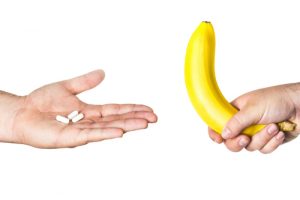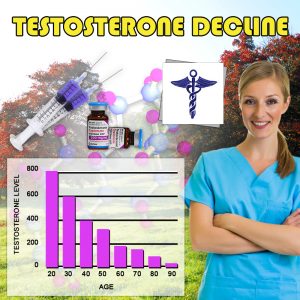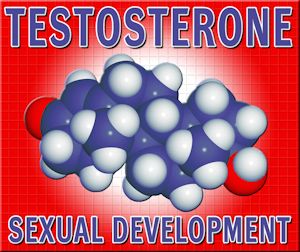 Testosterone deficiency is one of the most commonly under-diagnosed conditions in America today.
Testosterone deficiency is one of the most commonly under-diagnosed conditions in America today.
There are some reasons for this. For one, men tend to struggle to talk to their doctor about problems related to Low-T. They don't consider their fundamental sexual and fatigue-related issues to be the result of testosterone deficiency, or they just don't like to go to the doctor.
Video Link: https://vimeo.com/282905179
Video Download: Click Here To Download Video
Video Stream: Click Here To Stream Video
It's essential for your long-term health and vitality that you own up to the threat of Low-T, and be vocal with your doctor when you recognize the  symptoms.
symptoms.
By being honest with your physician, you can take steps to correct your sexual inadequacy, your declining metabolism, and your fading energy levels.
It's easy to misinterpret low testosterone symptoms as merely age-related decline, or the result of your own actions, but the truth is that a significant component of testosterone deficiency is innate in human physiology.
When Will Men Experience Low-T?
Of course, not every man will experience these symptoms at the same time, and some men may never reach a point of deficiency in their lifetime, but we all experience a similar decline for the same physiological reasons.
There are also some factors that people don't understand about Low-T.
For example, many men experience symptoms of testosterone deficiency as early as their thirties, especially those with conditions or lifestyles that suppress testosterone production.
Another common misconception is that only men can experience testosterone deficiency. In fact, women require testosterone to function as well, albeit at far lower concentrations.
In women, low testosterone levels can have a dramatic impact on sexual desire, as well as sexual pleasure and lubrication.
Though testosterone is not  currently commonly prescribed for women, as we understand the implications of testosterone therapy for women, therapeutic approaches will almost certainly appear in the future.
currently commonly prescribed for women, as we understand the implications of testosterone therapy for women, therapeutic approaches will almost certainly appear in the future.
The bottom line is that testosterone is one of the most critical hormones produced by the human body, necessary for promoting health and masculinity in men, and optimal function in women.
What is Low-T?
Low-T is a term which represents the time in a patient's life when his testosterone levels have dropped to a point where his wellness begins to suffer as a result. Testosterone deficiency symptoms take many forms.
What are Low Testosterone Symptoms?
Testosterone deficiency is most commonly associated with ills of a sexual nature. Men with Low-T struggle to generate sexual and romantic passion for their partner. They also tend to have issues with erectile function and general sexual performance.
This is where most people's knowledge of testosterone deficiency  ends, however. Testosterone is a critical anabolic and androgenic hormone.
ends, however. Testosterone is a critical anabolic and androgenic hormone.
Low-T causes metabolism to fall, which leads to weight gain. It suppresses the body's ability to generate muscle mass.
Low-T also plays an influential role in maintaining healthy energy levels. One of the most debilitating symptoms of testosterone deficiency is fatigue.
Furthermore, robust testosterone levels are strongly associated with psychological health in men. Low-T is correlated with an increased incidence of depression, anxiety, and low confidence.
As you can see, testosterone deficiency has a distinctly negative impact on overall wellness in men that reaches far beyond sexual health!
What is the Threshold of Low-T?
 Testosterone is present and essential for both men and women.
Testosterone is present and essential for both men and women.
In men, the hormone is produced primarily by the testes, but also by the adrenal glands. In women, Testosterone is produced in small amounts by both the adrenal glands and the ovaries.
Testosterone deficiency is defined as testosterone levels below a certain threshold which are also combined with noticeable symptoms associated with Low-T. The general “normal” range for testosterone production among males is 350-1,230 ng/dL.
There is an ongoing debate regarding the threshold for testosterone deficiency, but this is the current rule of thumb.
Of course, your hormone doctor will use his or her judgment regarding your need for treatment, because some men are more sensitive to hormone decline than others, and may require treatment even if they are currently at the lower end of normal. Less than 350 ng/dL is almost universally considered Low-T.
Women need significantly less testosterone to function normally. The baseline for testosterone deficiency in women is regarded as 70 ng/dL. While progesterone and estrogen are far more dominant in women, testosterone still plays a vital role.
How Common is Testosterone Deficiency?
Low-T is incredibly common in the United States, and symptoms are appearing in men at an earlier age than before, because of widespread issues such as diabetes, obesity, and sedentary lifestyle.
The FDA believes that around five million males in the United States currently struggle with testosterone deficiency. It's also recognized that Low-T is frequently misdiagnosed.
For example, men often experience anxiety, fatigue, and mood swings as a result of testosterone deficiency, which can easily be misconstrued as clinical depression.
It's becoming increasingly common for physicians to test for Low-T at earlier ages than ever before, to assess the patient's potential need for Hormone Replacement Therapy (HRT).
How Can I Relieve the Symptoms of Low-T?
There are some things that you can do to help improve your baseline testosterone production.
For example, anaerobic exercise, such as weightlifting, has a profound impact on testosterone production, as does High-Intensity Interval Training (HIIT), a brand of cardiovascular exercise that emphasizes pushing your body to the limit periodically to put pressure on your body and your muscles.
You can also cut back on smoking, drinking, or improve your diet. Even adopting better sleeping habits can lead to enhanced testosterone levels!
Of course, as we mentioned, the older that you get, the lower your baseline will ultimately become, in spite of your most conscientious efforts.
Declining testosterone levels are just an unavoidable aspect of aging without medical intervention. Luckily, Testosterone Replacement Therapy (TRT) has proven itself to be safe and effective in the war against Low-T.
There are many forms of testosterone HRT, including creams that are intended to be applied topically, patches that are adhered to the skin, and testosterone injections. The most common forms of Low-T injection are Testosterone Cypionate and Testosterone Enanthate.
Hormone Clinics for Low-T and Hormone Replacement Therapy
There are hormone clinics nationwide that specialize in hormone treatments like prescription testosterone.
Our clinic can arrange for Low-T testing, as well as a Comprehensive Hormone Panel which will help to reveal any other underlying hormone deficiencies or physiological issues that may be impairing your wellness. Testosterone deficiency is diagnosed by measuring free and total testosterone levels in the bloodstream.
If our analysis shows that you can safely benefit from bio-identical testosterone, we can get you started right away! We work with local doctors to make the process of HRT diagnosis and treatment simple and easy!
We offer a free consultation, and we'd love to work with you to help you overcome hormone imbalance and deficiency! We also provide other treatments such as bio-identical HGH therapy, Sermorelin Acetate, the HCG Diet, and more!
Reference
Low Testosterone Levels and Metabolic Syndrome in Aging Male.
Contact Us Today For A Free Consultation

- Testosterone for Women [Last Updated On: December 1st, 2023] [Originally Added On: December 29th, 2013]
- Testosterone Androgen [Last Updated On: December 11th, 2023] [Originally Added On: December 29th, 2013]
- Testosterone and Body Building [Last Updated On: December 14th, 2023] [Originally Added On: December 30th, 2013]
- Testosterone Levels [Last Updated On: December 6th, 2023] [Originally Added On: December 31st, 2013]
- Testosterone Gel, Cream, and the Testosterone Patch [Last Updated On: November 28th, 2023] [Originally Added On: December 31st, 2013]
- Buy Testosterone | Types of Testosterone Replacement Therapy Programs, Injections, Cream and Gel [Last Updated On: December 13th, 2023] [Originally Added On: December 31st, 2013]
- Buy Testosterone Injections Online, Testosterone Prescription for Low T, Testosterone Replacement Therapy [Last Updated On: October 16th, 2020] [Originally Added On: January 1st, 2014]
- Aging and Testosterone Replacement Therapy [Last Updated On: December 12th, 2023] [Originally Added On: January 3rd, 2014]
- What Causes Low Testosterone [Last Updated On: December 10th, 2023] [Originally Added On: January 7th, 2014]
- Hormone Levels in Men [Last Updated On: December 4th, 2023] [Originally Added On: January 12th, 2014]
- Hormone Level Testing [Last Updated On: November 29th, 2023] [Originally Added On: January 13th, 2014]
- Types of Testosterone Products and Delivery [Last Updated On: December 8th, 2023] [Originally Added On: January 22nd, 2014]
- Testosterone Therapy Helps Men with Low-T Ward Off Prostate Cancer [Last Updated On: May 29th, 2024] [Originally Added On: December 29th, 2019]
- The Importance of Dietary Fat for Testosterone Production [Last Updated On: July 8th, 2024] [Originally Added On: January 2nd, 2020]
- Testosterone Deficiency and Low-T at Epidemic Levels Among Men in the United States [Last Updated On: May 27th, 2024] [Originally Added On: May 17th, 2020]
- The Effects of Testosterone Therapy on Male Patients -- Who Should Use Testosterone? [Last Updated On: December 20th, 2023] [Originally Added On: June 16th, 2020]
- Does Ibuprofen Contribute to Low Testosterone? [Last Updated On: January 27th, 2024] [Originally Added On: June 20th, 2020]
- The Link Between Testosterone and Lower Rates of Autoimmune Diseases Among Men [Last Updated On: January 30th, 2024] [Originally Added On: June 21st, 2020]
- Weight Cycling and the Problem with Crash Dieting [Last Updated On: April 8th, 2024] [Originally Added On: July 30th, 2020]
- Reexamining Bio-Identical Testosterone Therapy [Last Updated On: June 18th, 2024] [Originally Added On: August 12th, 2020]
- Understanding how Muscle and Fat Impact Body Mass, Weight, and Health [Last Updated On: April 15th, 2024] [Originally Added On: August 25th, 2020]
- The Role of Nitric Oxide in Cancer Proliferation And Prevention [Last Updated On: May 3rd, 2024] [Originally Added On: August 26th, 2020]
- Understanding Heartburn in the 21st Century [Last Updated On: April 24th, 2024] [Originally Added On: August 28th, 2020]
- What is Erectile Dysfunction? [Last Updated On: April 20th, 2024] [Originally Added On: August 30th, 2020]
- Sermorelin Acetate Drug Information [Last Updated On: April 7th, 2024] [Originally Added On: August 31st, 2020]
- Exercise and Mental Health [Last Updated On: April 5th, 2024] [Originally Added On: September 1st, 2020]
- The Importance of Proteins, Carbs, and Fats [Last Updated On: March 11th, 2024] [Originally Added On: September 2nd, 2020]
- Low-T Treatment Before and After -- How Testosterone Therapy Improves Vitality [Last Updated On: April 9th, 2024] [Originally Added On: September 6th, 2020]
- Changes to LabCorp Guidelines for Low-T Diagnosis and How They Impact Your Treatment [Last Updated On: July 14th, 2024] [Originally Added On: September 22nd, 2020]
- The Effects of Testosterone on Asthma Prevalence Among Men and Women [Last Updated On: February 19th, 2024] [Originally Added On: October 6th, 2020]
- 7 Exercises to Elevate Testosterone Levels [Last Updated On: June 13th, 2024] [Originally Added On: October 10th, 2020]
- Vitamin A is Essential for Good Health - Are You Getting Enough ? [Last Updated On: April 16th, 2024] [Originally Added On: October 14th, 2020]
- Testosterone and Diet – How to Support Testosterone Levels with Healthy Eating [Last Updated On: June 7th, 2024] [Originally Added On: October 29th, 2020]
- The Significance of Telomeres in Stem Cell Treatments [Last Updated On: March 16th, 2024] [Originally Added On: November 27th, 2020]
- The Influence of Testosterone on Protective Mating Behaviors in Men [Last Updated On: January 25th, 2024] [Originally Added On: December 6th, 2020]
- The Role of Testosterone in Women's Health [Last Updated On: December 24th, 2023] [Originally Added On: December 7th, 2020]
- Testosterone Promotes Bone Health and Can Help Treat Osteoporosis [Last Updated On: February 15th, 2024] [Originally Added On: December 17th, 2020]
- The Relationship Between Testosterone and Cortisol [Last Updated On: April 2nd, 2024] [Originally Added On: December 19th, 2020]
- The Importance of Sex Hormone-Binding Globulin (SHBG) for Healthy Testosterone Levels [Last Updated On: March 9th, 2024] [Originally Added On: December 28th, 2020]
- 12 Health Issues That Can Kill Libido and Limit Sexual Performance [Last Updated On: May 23rd, 2024] [Originally Added On: January 3rd, 2021]
- 4 Foods to Boost Your Testosterone Levels [Last Updated On: February 7th, 2024] [Originally Added On: January 4th, 2021]
- Is Male Menopause Real? The Science of Andropause [Last Updated On: January 15th, 2024] [Originally Added On: January 11th, 2021]
- Relieve Fatigue and Increase Energy with Testosterone Replacement Therapy [Last Updated On: January 16th, 2024] [Originally Added On: January 16th, 2021]
- How to Administer a Testosterone Injection -- Low-T Injection Guide [Last Updated On: February 28th, 2024] [Originally Added On: January 17th, 2021]
- Testosterone Levels Associated with Serotonin Activity in the Brain [Last Updated On: March 26th, 2024] [Originally Added On: January 19th, 2021]
- Grumpy Old Man Syndrome – Causes and Treatments [Last Updated On: June 8th, 2024] [Originally Added On: January 22nd, 2021]
- The Effects of Beer on Testosterone Production and Gynecomastia [Last Updated On: March 21st, 2024] [Originally Added On: January 30th, 2021]
- Testosterone Frequently Asked Questions [Last Updated On: February 6th, 2024] [Originally Added On: February 26th, 2021]
- Testosterone Supplements: Vitamin and Amino Acid Pills Versus Real Testosterone [Last Updated On: November 21st, 2024] [Originally Added On: March 1st, 2021]
- Testosterone Side Effects, Risks, Dangers and Negative Effects [Last Updated On: November 7th, 2024] [Originally Added On: March 2nd, 2021]
- Testosterone for Men [Last Updated On: February 20th, 2024] [Originally Added On: April 13th, 2021]
- Testosterone Testing [Last Updated On: November 9th, 2024] [Originally Added On: May 7th, 2021]
- Hormone Replacement Therapy: Commonly Asked Questions [Last Updated On: February 20th, 2024] [Originally Added On: June 16th, 2023]
Word Count: 1167




















